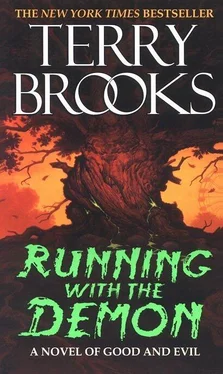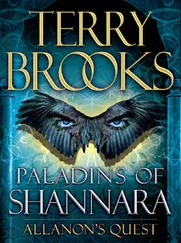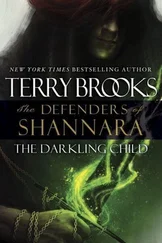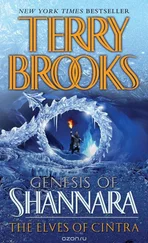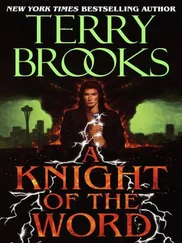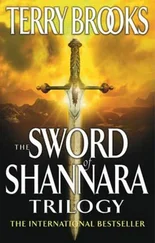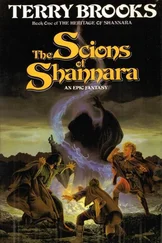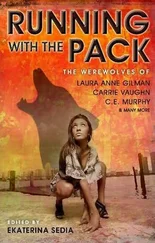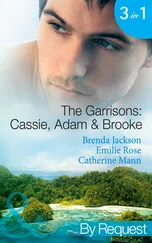"Poor you," she replied, snapped the gun stock to her shoulder, and blew a hole right through his chest. The whole front of his shirt exploded in a gruesome red shower and the demon was knocked backward onto the shadow–streaked lawn.
Except that a moment later, he wasn't there at all. He simply disappeared, fading away into the ether. Then abruptly he reappeared six feet farther to the right, unharmed, standing there looking at her, laughing softly.
"Your aim was a little off." He smirked.
Feeders raced back and forth, darting toward her with lightning–quick rushes, frantic with hunger. She realized at once what had happened. It wasn't the demon she had fired at. It was an illusion he had created to fool her.
"Good–bye, Evelyn," he whispered.
His hand lifted in a casual gesture, drawing her eyes to his, and she felt a crushing force close about her chest. She wrenched her eyes away, brought up the shotgun, and fired a second time. Again, the demon's chest blew apart and he was flung away. The feeders ran in all directions, clawing their way onto the porch only to leap off again, lantern eyes wild with expectation. Evelyn was already swinging the barrel of the shotgun about, searching for him, firing both left and right of where he had been, the heavy shot ripping the air, lead pellets hammering into the fence posts at the gate and into the trunks of the old shagbarks and the graceful limbs of the spruce. Lights started to come on in the houses closest to hers.
"Damn you!" she hissed
She racked the slide a fifth time, chambering a fresh shell, swung the barrel to her right, where the feeders were massed thickest, and fired into their midst, the shotgun booming. Her arms and shoulders throbbed with weariness and pain, and her rage burned in her throat and chest like fire. One shell left. She saw him climbing over the railing at the other end of the porch, pumped the final shell into the firing chamber, swung the shotgun left, and fired down the length of the house.
Reload!
She backed against the screen door and fumbled for the shells in her dress pocket, kicking at the empties underfoot. He was right in front of her then, reaching out his hand. She felt his fingers on her chest, pressing. The shotgun fell away as she sought to claw his face.
Then the feeders swarmed over her, and everything disappeared in a bright red haze.
George Paulsen ran from the Sinnissippi Townhomes and the screams of Enid Scott, his hands covering his face. He burst through the screen door of the Scott apartment with such force that he ripped it from its hinges and tore the skin from his hands. There waS blood on him everywhere, and the stink of it was in his nostrils. But it was not from the screams or the blood or even the ragged, broken form he had left crumpled on the living–room floor that he fled.
It was from Evelyn Freemark.
She was right in front of him, a shimmering image come out of the ether, dark and spectral. No matter which way he turned, there she was. She whispered at him, repeating the words she had spoken earlier that day in the park, her dark warning of what would happen if he laid a hand on Enid Scott or her children. He screamed against the persistent sound of it, tearing at the air and at his own face. He ran mindlessly across the barren dirt yard into the roadway, desperate to escape.
The dark things bounded after him, the creatures that had appeared as he beat aside Jared Scott's futile defenses. They had encouraged him to hurt the boy; they had wanted the boy to suffer.
But now they were coming after him as well.
He could feel their hunger in the ragged sound of their breathing.
Oh, God! Oh, God! He screamed the words over and over into the silence and the dark.
Staggering blindly up the roadway, he crested the rise that led out to Lincoln Highway, and a car came out of the lights of the buildings ahead. George Paulsen lurched aside as the car raced past, its horn blaring angrily. The dark things caught him then, bore him back against the cemetery fence, and began to rip him apart. His insides were being shredded beneath their claws and teeth; he could hear himself shriek. With the dark things clinging to him, he turned toward the cemetery fence and scrambled up the chain links. He reached the top, lost his footing, and slid back heavily. He grabbed for something to slow his fall, hooked his fingers into the mesh, and caught his neck on the exposed edges of a gap near the fence top.
Jagged steel sliced through soft flesh and exposed arteries, and George Paulsen's blood gushed forth. He sagged weakly, pain flooding through him. The dark things slowed their attack, closing on him more deliberately, taking their time. He wouldn't escape them now, he knew. He closed his eyes against his fear and desperation. They were touching him, their fingers dipping experimentally in his blood. Oh, God!
A moment later, the life went out of him.
Chicago is afire. Everywhere the Knight of the Word looks the flames rise up against the darkening skyline, bleeding their red glare into the smoky twilight. It is an exceptionally hot, dry summer, and the parched grasses that fill the empty parks and push through the cracks in the concrete bum readily. The homes closest to the hollowed–out steel–and–glass monoliths of the abandoned downtown wait their turn, helpless victims of the destruction that approaches. Down along the piers and shipyards, old storage tanks and fuel wells blaze brightly, the residue of their contents exploding like cannon shots.
John Ross jogs quickly along the walkway bordering the Chicago River, moving south from the breach in the fortress walls. He carries his staff before him, but he has temporarily lost the use of its magic, the"consequence of another of those times in the past when he was forced to call upon it–before the Armageddon, before the fall. Thus he must flee and hide as common men. Already, his enemies look for him. They have tracked him here, as they track him everywhere, and they know that somewhere in the conflagration he will be found. A Knight of the Word is a great prize, and those who find him will be well rewarded. But they know, too, that he will not be taken easily, and their caution gives him an edge.
He has come late to the city's fall. The attack has been in progress for months, the once–men and their demon masters laying siege to the makeshift walls and reinforced gates that keep the people within protected. Chicago is one of the stron-, gest bastions remaining, a military camp run with discipline and skill, its people armed and trained. But no bastion is impregnable, and the attackers have finally found a way in. He is told they gain entry through the sewers, that there is no longer any way of keeping them out. Now the end is at hand, and there is nothing anyone can do but flee or die.
Bodies line the streets, flung casually aside by those who, leave them lifeless. Men, women, and children–no exceptions \ are made. Slaves are plentiful and food is scarce. Besides, a \ lesson is needed. Feeders slink through the shadows, working \ their way'from corpse to corpse, seeking a shred of fading life, of pain, of horror, of helpless rage, of shock and anguish on which to feed. But the battle moves on to other places, and so the feeders follow after. Ross works his way along a brick wall fronting the postage–stamp yards of a line of abandoned brick homes, searching for a way out, listening to the screams and cries of those who have failed to do so. The attack shifts to a point ahead of him, and he recognizes the danger. He must turn back. He must find another way. But his options are running out, and without the magic to protect him he is less certain of what he should do.
Finally he begins to retrace his steps, angling west toward the outskirts of the city, away from Lake Michigan and the downtown. It will be nightfall soon, and the hunters will not find him so easily. If he can reach the freeways, he can follow them into the suburbs and be gone before they realize he has escaped. His throat is dry, and his muscles ache, for he has not slept in days. His coming to the city was in response to a dream that foretold of its destruction. But he is mistrusted everywhere, a Cassandra crying out in the wilderness of a crumbling Troy, and his warnings are ignored. Some would imprison him as a spy. Some would throw him from the walls. If they did not fear his magic, he would already be dead. It is a pointless, debilitating life he leads, but it is all he has left.
Читать дальше
